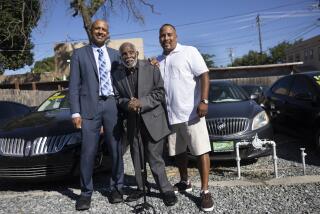Killer Abandons Appeal of Conviction in ’96 Slaying
- Share via
Five months after he apologized for shooting an elderly Oxnard woman through the heart, Alan Brett Holland has abandoned an appeal to his first-degree murder conviction.
Holland, who asked for death rather than a lifetime behind bars when he was sentenced in March, sent a terse, one-page statement to the Court of Appeal in Ventura last week requesting that any legal challenges be dismissed.
“I have discussed the case and the abandonment with my attorney,” Holland wrote, “and I am making this decision voluntarily.”
At the bottom of the document, Holland added a three-line postscript in his own handwriting: “P.S. I am signing this form today because as I understand it, it means to me that I do not wish to appeal my case. I repeat I do not want to pursue my appeal and let what has been done stay as is.”
On Wednesday, Presiding Justice Steven J. Stone granted Holland’s request and issued a court order dismissing the appeal, which was filed four days after the 31-year-old was sentenced to life in prison without the possibility of parole.
Even at that time, Holland indicated he was not interested in fighting the conviction. Appellate attorney Leonard J. Klaif said Holland recognized that he would face a life sentence either way because he had admitted to the shooting. “It just didn’t seem worth it to him to put anyone through it,” Klaif said of the appeals process. “He feels great remorse and sorrow, and he realizes the penalty is not inappropriate.”
Legal experts say it is rare for a defendant to abandon appeal rights, especially in a first-degree murder case in which the sentence is so severe.
“It is unusual because generally the defendants figure they have nothing to lose,” said Laurie Levenson, associate dean at Loyola Law School. “You figure it won’t get any worse.”
But prosecutors said they were not surprised by Holland’s decision given his statements and bizarre behavior at trial.
The drifter made obscene gestures to the jury during the presentation of evidence.
Against the advice of his attorney, Holland took the stand during the penalty phase of his trial, occasionally bursting into sudden fits of laughter and at one point calling the jurors “scum bags.”
Holland also disputed the prosecution’s theory that he shot 65-year-old Mildred Wilson to steal her car from the parking lot of the Poinsettia mall in Ventura on July 17, 1996.
In a letter sent to Deputy Dist. Atty. Donald C. Glynn after his conviction, Holland wrote, “I killed the ol’ goat because she didn’t shut up.”
Holland later explained in a rambling 14-page letter to Superior Court Judge Vincent J. O’Neill that his actions were designed to encourage jurors to deliver a death sentence.
But his plan backfired, instead convincing jurors that he was not a carjacker but an extremely disturbed individual.
“It doesn’t surprise me too much,” Glynn said Wednesday after learning that Holland had abandoned his appeal. “It is weird.”
Ironically, Holland may have had legitimate issues on which to appeal his case.
After the verdict, several jurors said Holland’s story during the penalty phase raised doubts in their minds about his motives for the killing. Had his story been presented to the jury earlier, he may have been convicted of a lesser crime.
“He probably has a reasonable issue,” Glynn said. “This stuff that he came up with was persuasive to the jury.”
Deputy Dist. Atty. John Blair said he was not surprised by Holland’s decision.
“He’s a different character,” Blair said. “And maybe he wants to take responsibility for what he did.”
Given Holland’s history, Levenson said, it’s difficult to guess the defendant’s true motives.
“You can either see it as his way of making peace for what he’s done or doing exactly what the system doesn’t expect,” she said. “It’s either an act of protest or an act of resignation.”
Either way, Holland’s decision to abandon his state appeal does not necessarily close the door on other legal challenges in the future. Levenson said he could still file a petition for writ of habeas corpus.
“It sounds like he is tired of the fight,” Levenson said. “But after a few more years in jail, he might be ready for another one.”
More to Read
Sign up for Essential California
The most important California stories and recommendations in your inbox every morning.
You may occasionally receive promotional content from the Los Angeles Times.













